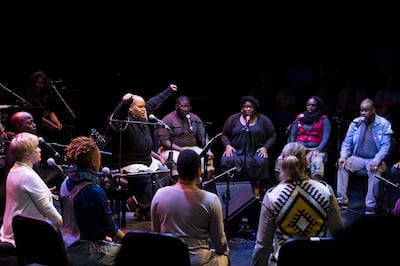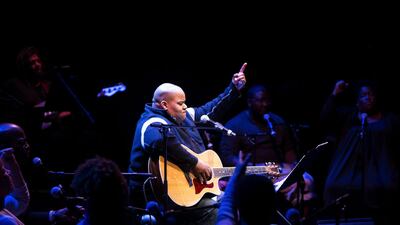The year is 2024. Disease is ravaging the planet, global warming is overwhelming food supplies, clean water has become scarce, and rampant violence is taking over. Society outside a few walled communities have descended into chaos; and, to make matters worse, the US has a president who is more interested in spouting strongman slogans than bettering the lives of his people.
Parts of this landscape may be somewhat familiar, but it is actually the world in Octavia E Butler's Parable of the Sower.
The novel is the basis of an opera streaming Wednesday, April 22, at 8pm as part of NYU Abu Dhabi’s Reconnect series. It was filmed at the university’s The Black Box venue in September 2015, and marked the first show of the NYUAD Arts Centre.
The performance is a concert version of the opera, which saw its full-scale production premiere at the Arts Centre in November 2017 before going on to tour the world.
Toshi Reagon, who adapted the novel for the opera, says that with the performance showing on Earth Day, there is an important message to be gleaned from the story about our relationship to the planet.
"Butler's work in general is truly expansive in how it explores humans on earth and the way we live in relationship to the earth, the universe and each other," says the American musician.
“We don't have to be experiencing a climate crisis right now but we are. We are made of water so how could we be so reckless about the elements we literally need to survive on this planet?”
Parable of the Sower was a cautionary post-apocalyptic narrative when it was published in 1993. It warned of wealth inequality, an ever-widening income gap, and the return of corporate slavery.
In 2020, Butler’s dystopian fiction has never been more possible, more terrifying.
“The parable in the '90s looked forward and clearly imagined what would happen if humans did not live well with the earth and with each other.”
Yet, Reagon says it is hope and faith in mankind that drive the novel’s protagonists, particularly its main character, Lauren, a 15 year-old who is at the centre of a blossoming spiritual and philosophical idea called Earthseed.
“The novel is a story about us,” the singer-songwriter says. “A story about humanity and hope for the future. That no matter how bleak and harsh it gets, we can keep pushing forward.”

She also says she isn’t sure yet whether the coronavirus pandemic will drive us towards a Butleresque dystopia or inspire us to work together to forge a new destiny. But it is something she's been thinking about while self-isolating in her Brooklyn home.
“In a way, the Earth is showing us her self-healing powers. Of course I wish it was not in the form of a deadly virus that forces all away from each other and has already killed so many people but it does show the systemic lying about what humans are capable of in changing our condition on earth. We can be much better citizens on our planet.”
Reagon says that adapting the novel for the stage was not a straight-forward endeavour, especially considering that parts of the sequel Parable of the Talents were also used for the opera.
“We picked the characters and the conditions from the novel that we thought would tell a good story on stage. Everyone has two rolls except for six of us,” Reagon says. “Our show is considered big for American theater. We are independently produced. It's not like a Broadway show on tour. We raise money and get on the road in collaboration with our incredible presenters.”
Reagon – who began her musical career as a teenager in the early 1980s – says the musical styles for the opera range from funk to rock to blues and gospel music. But it is Reagon’s mother, Bernice Johnson Reagon, who is the musical foundation of the opera.
“My mother’s singing is based on the unaccompanied sacred music from Southwest Georgia, with a harmonic system that comes out of the 19th century. Our collaboration allowed us to explore over 200 years of black music,” Reagon says, adding that the first musicians she became obsessed with as a child were Jimi Hendrix and her mother.
Blending Butler’s dystopic world with African-American spiritualism was also important in challenging the forces that marginalize African-Americans in real life and in fiction.
“Science fiction and speculative fiction is to be without boundaries,” Reagon says. “Yet, so much of it does not see black people as a part of the future. It is a part of our sacred traditions to see ourselves more than what we are in our bodies. I know I am alive because my ancestors passed up to me songs that tell me who I am – who we live with.”
Talking about the coronavirus pandemic and the US government’s inability to take appropriate action, Reagon adds that it is difficult to create a path towards healing if “the leadership doesn't believe in the health and care of the nation and the world. So people have to do that work themselves.”
She illustrates her point by mentioning a scene in the parable, where Lauren meets a group of strangers when she ventures outside her walled community.
“The group lives on the principle that they will not hurt each other nor will they steal from one another. So we kind of have to do that as well. To make the promises not to hurt each other, to form systems of survival together. This is all in the book," she says.


